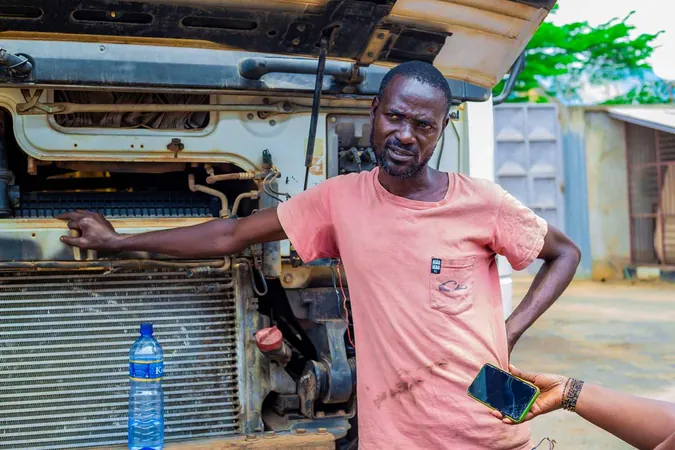
Mpox Crisis Escalates in Burundi: A Call to Action for Health Authorities
2024-12-11
Author: Emily
In the suburbs of Bujumbura, a 41-year-old mechanic named Nyabuyoya Balthazar shares his harrowing experience after battling mpox, a viral disease that the World Health Organization (WHO) classifies as a public health emergency of international concern (PHEIC). As he repairs cars in Kinama, Nyabuyoya reflects on his battle with this illness, which has gripped Burundi and several other nations since its latest outbreak.
His troubles began in September when he noticed troubling symptoms. “I felt a persistent headache, fatigue, and discovered a painful pimple in my genital area,” he recounted. Despite taking paracetamol, his condition didn't improve. Eventually, he sought medical help, where health workers educated him about mpox. After being tested, the diagnosis confirmed his fears—a positive result. Nyabuyoya faced a month of isolation and treatment in a hospital before he ultimately recovered.
Mpox Contagion in Burundi
Nyabuyoya is one among many who have survived the recent surge of mpox infections, which first emerged in Burundi on July 25, 2024. The new strain, Clade Ib, rapidly escalated the outbreak globally. As of December 9, Burundi has reported 2,334 cases, with one confirmed death. Bujumbura is the epicenter of this epidemic, alongside Gitega city. Alarmingly, children have been disproportionately affected, constituting 80% of the fatalities recorded through UNICEF reports.
Mpox, caused by a simian orthopox virus, is primarily transmitted through close contact, including sexual activity. Since 2022, it has affected over 120 countries, resulting in more than 115,000 cases and approximately 255 deaths worldwide. In Africa alone, 13,171 cases and 57 deaths have been documented between January and early December.
Challenges in Combatting Mpox
Dealing with mpox presents unique challenges for the healthcare system. Marie Niyonkuru, a health worker in Kabezi, highlighted the urgent need for education about the disease among healthcare providers. She emphasized the call for increased supplies of personal protective equipment (PPE) as frontline workers face the risk of exposure.
Recent weeks have brought signs of hope. By early November, Niyonkuru observed a decline in mpox cases, with the WHO's December situation report noting a potential plateau in the outbreak.
Regional Collaboration to Tackle Mpox
Facing the second-highest case rates in Africa, Burundi is now joining forces with the East African Community (EAC) to address this crisis. On November 1, the EAC initiated the deployment of its Rapidly Deployable Expert (RDE) Pool to support Burundi and other affected areas, including the Democratic Republic of the Congo, which reported over 7,000 cases by October.
Veronica Nduva, EAC Secretary-General, stated that the partnership aims to enhance responses to the epidemic through training programs on infection prevention, risk communication, and laboratory diagnostics.
These expert deployments are part of a broader strategy to boost local healthcare systems and provide communities with the necessary tools to combat the outbreak effectively. Authorities aim to ensure that essential medical supplies and PPE are accessible.
The Road Ahead for Survivors
While recovery is a relief, the journey for survivors like Nyabuyoya is far from over. Social stigma remains a pressing issue, with reports of discrimination against those who have contracted the virus. “Some neighbors avoid me, even though I’ve recovered,” shared Nyabuyoya.
In response, the Burundian government is launching awareness campaigns to combat misinformation surrounding mpox. Initiatives include radio advertisements on preventive measures and specialized awareness stands at hospitals. Surveillance teams are also engaging in contact tracing and investigations to reinforce public health measures.
As the mpox crisis continues to unfold, both local and international cooperation alongside community education will be crucial in battling this viral threat. The situation is a reminder that public health emergencies can only be addressed through collective action, making it imperative for communities to unite against the stigma and misinformation surrounding mpox.









 Brasil (PT)
Brasil (PT)
 Canada (EN)
Canada (EN)
 Chile (ES)
Chile (ES)
 España (ES)
España (ES)
 France (FR)
France (FR)
 Hong Kong (EN)
Hong Kong (EN)
 Italia (IT)
Italia (IT)
 日本 (JA)
日本 (JA)
 Magyarország (HU)
Magyarország (HU)
 Norge (NO)
Norge (NO)
 Polska (PL)
Polska (PL)
 Schweiz (DE)
Schweiz (DE)
 Singapore (EN)
Singapore (EN)
 Sverige (SV)
Sverige (SV)
 Suomi (FI)
Suomi (FI)
 Türkiye (TR)
Türkiye (TR)